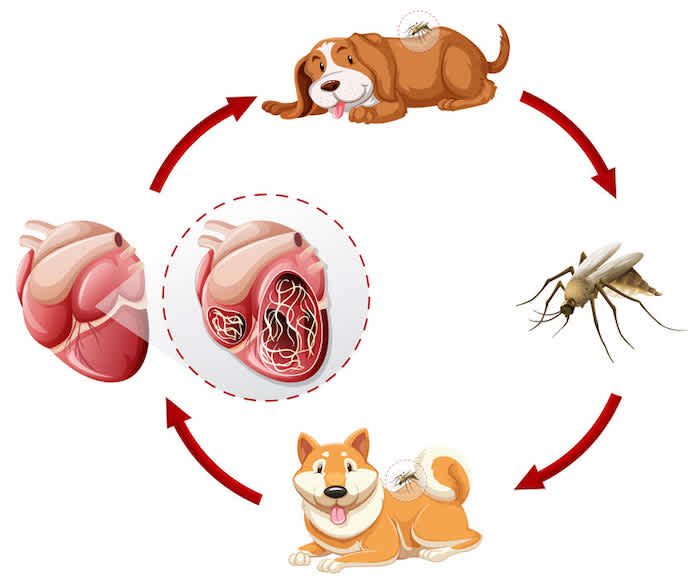Yes, congestive heart failure in dogs can lead to a painful death. It causes discomfort and distress due to the buildup of fluid in the lungs, leading to difficulties in breathing and reduced oxygen supply to the body.
Congestive heart failure is a serious and potentially life-threatening condition in dogs. Pet owners must understand the symptoms and seek prompt veterinary care to manage the condition effectively. By educating oneself about this condition and recognizing the signs early, it is possible to provide the best quality of life for dogs suffering from congestive heart failure.
This article will discuss the causes, symptoms, and treatment options for congestive heart failure in dogs, enabling pet owners to make informed decisions about their pet’s health.

Credit: www.today.com
Understanding Congestive Heart Failure
Congestive Heart Failure in dogs can be a difficult condition, but it is not necessarily a painful death. With proper care and management from a veterinarian, dogs with CHF can live a comfortable and fulfilling life. Understanding the symptoms and treatment options can help improve the quality of life for your furry friend.
What Is Congestive Heart Failure?
Congestive Heart Failure (CHF) in dogs is a serious and potentially life-threatening condition that affects the heart’s ability to pump blood effectively. It occurs when the heart becomes weakened or damaged, leading to a buildup of fluid in the lungs and other parts of the body. CHF can cause various symptoms and complications, making it crucial to understand this condition to ensure the best possible care for our furry friends.
Causes Of Congestive Heart Failure In Dogs
The causes of Congestive Heart Failure in dogs can be diverse, ranging from genetic predisposition to underlying health conditions. Some common causes include:
- Valvular Disease: Degenerative valve disease, such as mitral valve insufficiency, is a leading cause of CHF in older dogs. This condition occurs when the valves that regulate blood flow become thickened and weakened over time.
- Cardiomyopathy: Canine dilated cardiomyopathy (DCM) is another common cause of CHF. It is characterized by the enlargement and weakening of the heart muscle, reducing its ability to pump blood effectively.
- Heartworm Disease: Heartworms are parasitic worms that invade the heart and blood vessels. When left untreated, heartworm disease can lead to heart failure and CHF.
- Birth Defects: Some dogs may be born with structural abnormalities of the heart, such as ventricular septal defects or patent ductus arteriosus, which can predispose them to CHF later in life.
- Other Factors: Certain factors like age, obesity, high blood pressure, and certain medications can also increase the risk of developing CHF in dogs.
It is vital to note that the causes and progression of CHF can vary from one dog to another. Hence, seeking professional veterinary advice is crucial to determine the underlying cause and provide appropriate treatment for your furry companion.

Credit: bettervet.com
Symptoms Of Congestive Heart Failure
Congestive heart failure in dogs can manifest through various symptoms, making it crucial for pet owners to be aware of potential signs. Recognizing these symptoms early on can help in providing timely care and management to improve the quality of life for dogs suffering from this condition. Understanding the symptoms of congestive heart failure is vital for identifying potential issues and seeking efficient treatment for your beloved pet.
Early Signs Of Congestive Heart Failure
Paying close attention to your dog’s behavior and physical condition can aid in identifying early signs of congestive heart failure. Common early symptoms include coughing, excessive tiredness, difficulty breathing, and reduced exercise tolerance. These symptoms could be indicative of a potential heart problem and should be promptly discussed with a veterinarian for further evaluation.
Advanced Symptoms
As congestive heart failure progresses, more visible and severe symptoms may become apparent. Advanced symptoms can include persistent coughing, labored breathing, abdominal swelling, pale or bluish gums, and sudden collapse. When these signs are observed, immediate medical attention is necessary to alleviate the suffering of the dog and optimize therapeutic management.
Signs Of Pain In Dogs With Congestive Heart Failure
Dogs with congestive heart failure may exhibit signs of discomfort or pain. These signs can include restlessness, whimpering, decreased appetite, irritability, and reluctance to move or be touched. Identifying and addressing signs of pain in dogs with congestive heart failure is essential in providing proper care and ensuring their well-being.
Evaluating The Pain Level In Dogs With Congestive Heart Failure
Evaluating the Pain Level in Dogs with Congestive Heart Failure
Assessing Pain In Dogs
Congestive heart failure (CHF) in dogs can cause discomfort and pain, but evaluating the exact pain level can be challenging, as dogs may not always show obvious signs of distress. Pet owners and veterinarians must be vigilant in monitoring their furry companions for any indication of discomfort or pain. Assessing pain in dogs with CHF involves observing their behavior, examining their physical condition, and taking note of any changes in their activity level and appetite.
Pain Scoring Systems
In some cases, a pain scoring system may be utilized to quantify the level of discomfort in dogs with CHF. These systems typically involve assessing various factors such as body posture, vocalization, and touch response. By using a standardized scoring system, veterinarians can more accurately gauge the extent of pain experienced by dogs with congestive heart failure, which can guide treatment decisions and help improve the overall quality of life for these beloved pets.
Pain Management Options
When it comes to managing pain in dogs with congestive heart failure, various options may be considered. These can include medications, lifestyle modifications, and supportive care measures. It’s essential to work closely with a veterinarian to develop a comprehensive pain management plan tailored to the individual needs of the dog. By effectively addressing and alleviating pain associated with CHF, pet owners can help ensure that their canine companions experience the highest possible level of comfort and well-being.
Quality Of Life For Dogs With Congestive Heart Failure
Congestive Heart Failure in dogs can cause discomfort but proper management and care can greatly improve their quality of life. With appropriate medication, diet, exercise, and regular veterinary check-ups, dogs with Congestive Heart Failure can lead a relatively pain-free life.
Factors Affecting Quality Of Life
When it comes to congestive heart failure (CHF) in dogs, understanding the factors that can affect their quality of life is crucial. Several variables can influence how comfortable and happy a dog with CHF feels. Here are some key factors:
- Stage of CHF: The stage at which the condition is diagnosed plays a significant role in determining a dog’s quality of life. Early detection allows for proactive management and may lead to a better prognosis.
- Underlying cause: Identifying the underlying cause of CHF, such as mitral valve disease or dilated cardiomyopathy, is essential for tailoring the treatment plan and improving the dog’s overall well-being.
- Severity of symptoms: The severity of the symptoms experienced by the dog can greatly affect their quality of life. Common symptoms include coughing, difficulty breathing, fatigue, and reduced exercise tolerance. Proper symptom management is key.
- Treatment compliance: Adhering to the prescribed treatment regimen is vital for maintaining a dog’s quality of life. Administering medications, following dietary guidelines, and attending regular veterinary check-ups are crucial for managing CHF effectively.
- Coexisting conditions: Dogs with CHF may also have other health issues, such as arthritis, kidney disease, or diabetes. Taking these conditions into consideration and addressing them alongside CHF is essential for optimizing the dog’s comfort.
Improving Comfort And Happiness
Improving the comfort and happiness of dogs with congestive heart failure is the primary goal of their caregivers. Here are some strategies that can help enhance their quality of life:
- Medications: Veterinarians may prescribe a combination of medications to manage symptoms, control blood pressure, and remove excess fluid from the body. These medications can greatly alleviate discomfort and improve the dog’s overall well-being.
- Dietary changes: A heart-healthy diet, recommended by the veterinarian, can help manage CHF and optimize the dog’s comfort. Specialized diets low in sodium and high in essential nutrients are commonly recommended.
- Exercise and weight management: Regular, low-impact exercise can help maintain muscle strength and keep the heart healthy. Proper weight management is also crucial to reduce strain on the heart.
- Comfortable environment: Creating a comfortable and stress-free environment for the dog is vital. Providing soft bedding, a quiet space, and avoiding excessive heat or cold can contribute to their overall comfort.
- Emotional support: Dogs with CHF may experience anxiety or stress due to their condition. Providing gentle reassurance, engaging in positive interactions, and considering complementary therapies like canine massage or acupuncture can aid their emotional well-being.
End-of-life Care And Decisions
As dogs with congestive heart failure progress in their condition, end-of-life care and decisions may become necessary. It’s important to work closely with the veterinarian to understand the options and make informed choices regarding the dog’s well-being.
Some considerations during end-of-life care may include:
- Pain management: Ensuring that the dog is as comfortable as possible is a top priority. Palliative care, pain medications, and other supportive measures can help alleviate any pain or discomfort.
- Supportive therapy: Additional supportive therapies, such as oxygen therapy or fluid therapy, may be recommended to manage symptoms and maintain the dog’s comfort.
- Quality-of-life assessment: Regular evaluations of the dog’s quality of life can help determine if adjustments to the treatment plan are necessary. The focus shifts to providing comfort rather than aggressive treatment.
- Humane euthanasia: When a dog’s quality of life significantly declines, and their suffering cannot be adequately managed, the difficult decision of humane euthanasia may have to be considered. Veterinarians can provide guidance and support to ensure a peaceful and pain-free passing.
Providing Support For Dogs And Owners
Importance Of Veterinary Care
Regular veterinary care plays a crucial role in supporting dogs with congestive heart failure (CHF). By scheduling routine check-ups with a veterinarian, dog owners can ensure that their furry companions receive appropriate medical attention and treatment. A veterinarian will assess the dog’s condition, monitor any changes in symptoms, and prescribe necessary medications to manage CHF effectively. In addition to routine check-ups, it is essential to follow the veterinarian’s advice regarding medication administration, exercise restrictions, and dietary recommendations specific to a dog with CHF.
Emotional Support For Owners
Dealing with a pet’s illness can take a toll on the emotional well-being of the dog’s owners. As CHF is a progressive disease, owners must seek emotional support during this challenging time. Connecting with support groups, either online or in person, can provide a sense of community and understanding. Sharing experiences, concerns, and coping techniques with others who are going through a similar situation can be immensely beneficial. Additionally, seeking professional help from counselors or therapists experienced in pet loss and grief can provide significant support for owners struggling with the emotional impact of their pet’s CHF diagnosis.
Making Informed Decisions
When faced with the diagnosis of CHF in their dog, owners are often confronted with difficult decisions regarding their pet’s care and quality of life. Owners need to gather as much information as possible to make well-informed decisions that consider both the dog’s needs and their capabilities.
Consulting with the veterinarian about available treatment options, potential risks, and the expected outcomes can help owners understand the possible choices. Being aware of the symptoms that indicate pain or distress in dogs with CHF can also guide decision-making, ensuring that the dog’s comfort and well-being are prioritized throughout the treatment journey.

Credit: www.smalldoorvet.com
FAQ For Is Congestive Heart Failure In Dogs A Painful Death
Is Congestive Heart Failure In Dogs Painful?
Yes, congestive heart failure in dogs can be a painful condition. Dogs with congestive heart failure may experience difficulty breathing, coughing, weakness, and loss of appetite. It is important to provide them with proper medical treatment and pain management to improve their quality of life.
Can Congestive Heart Failure In Dogs Be Treated?
Yes, congestive heart failure in dogs can be treated. Treatment typically involves a combination of medication, dietary changes, and lifestyle modifications. Medications may include diuretics, ACE inhibitors, and beta-blockers. Your veterinarian will create a personalized treatment plan based on your dog’s specific needs.
How Can I Prevent Congestive Heart Failure In My Dog?
While congestive heart failure cannot always be prevented, there are steps you can take to reduce the risk. Regular veterinary check-ups, maintaining a healthy weight, and providing regular exercise. Feeding a balanced diet can help promote heart health in dogs.
It is also important to be aware of any breed-specific heart conditions your dog may be prone to.
What Are The Signs Of Congestive Heart Failure In Dogs?
Signs of congestive heart failure in dogs may include coughing, and difficulty breathing. Difficulty breathing easily, decreased appetite, weight loss, and bloating. If you notice any of these symptoms, it is important to consult your veterinarian for a proper diagnosis and treatment plan.
Conclusion
Congestive heart failure in dogs can indeed result in a painful death. The disease progresses gradually, impacting the heart’s ability to pump blood effectively. This leads to symptoms such as difficulty breathing, fatigue, and fluid buildup in the lungs and other organs.
To alleviate suffering, prompt diagnosis and appropriate treatment are crucial. Animal owners should work closely with their veterinarians to provide the best possible care and support for their furry companions. By being vigilant and proactive, we can strive to enhance the quality of life for dogs with congestive heart failure.



